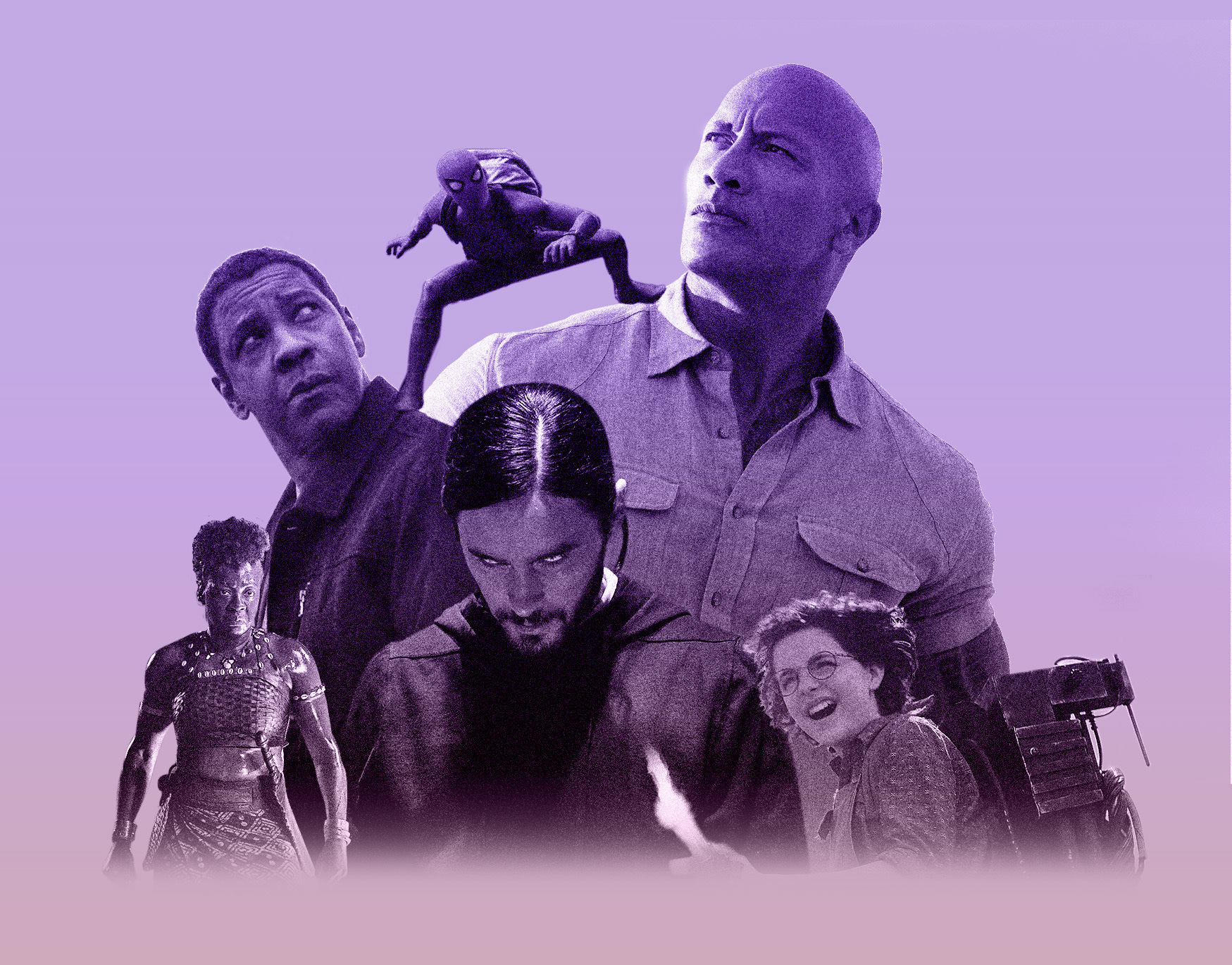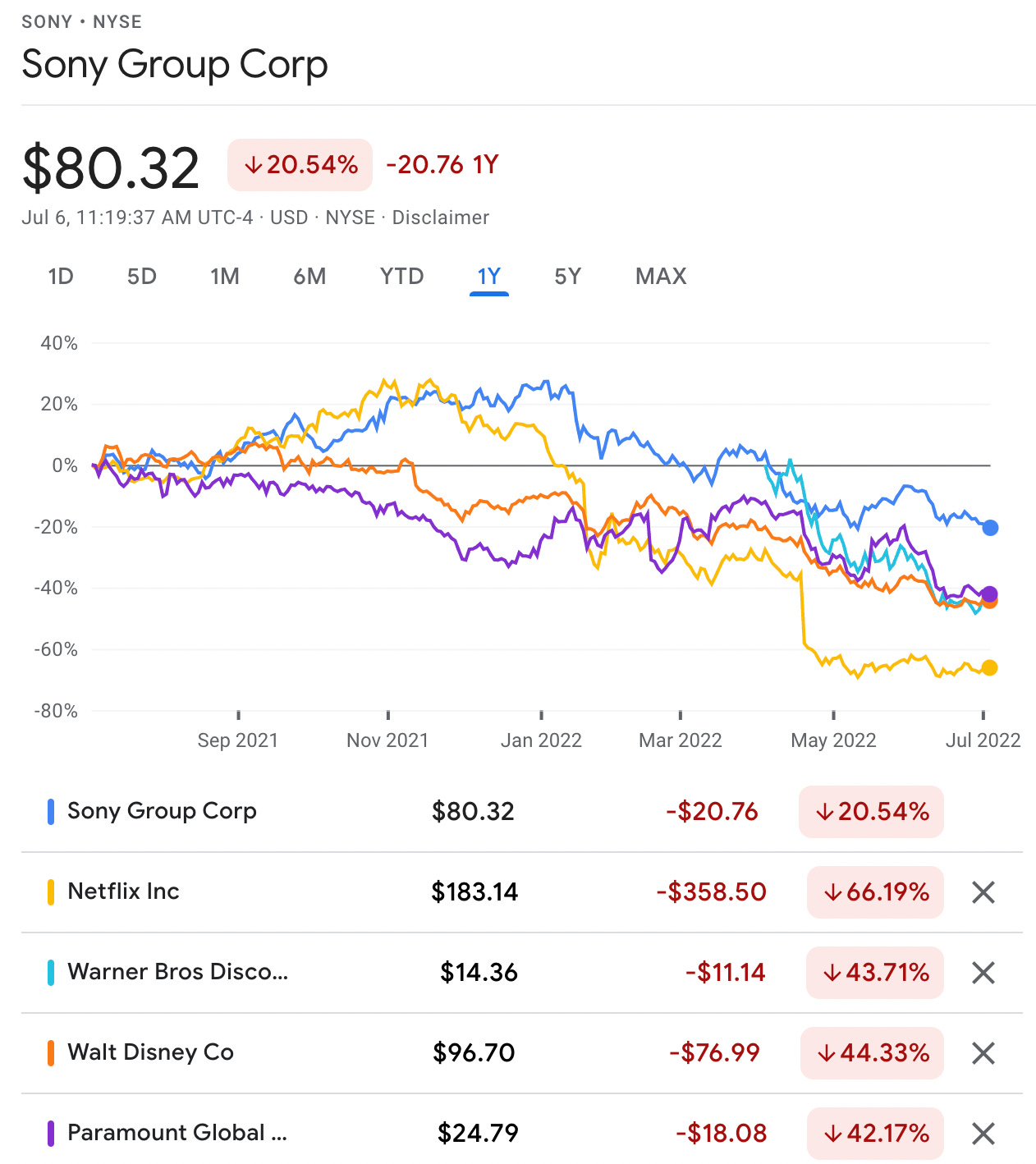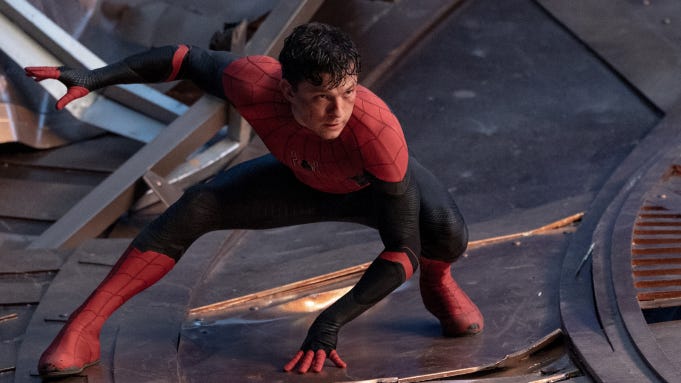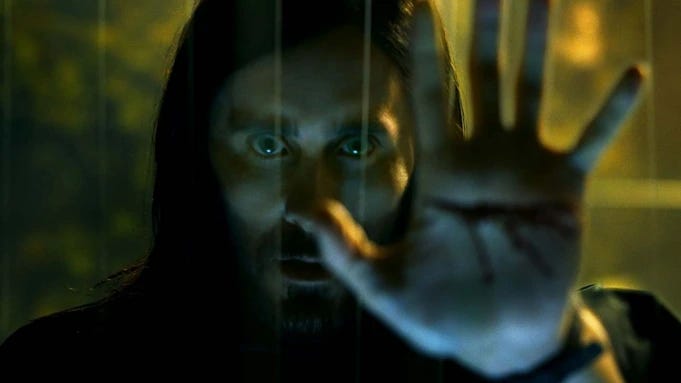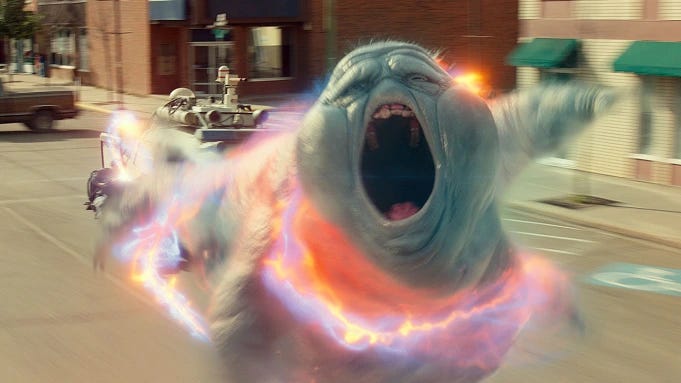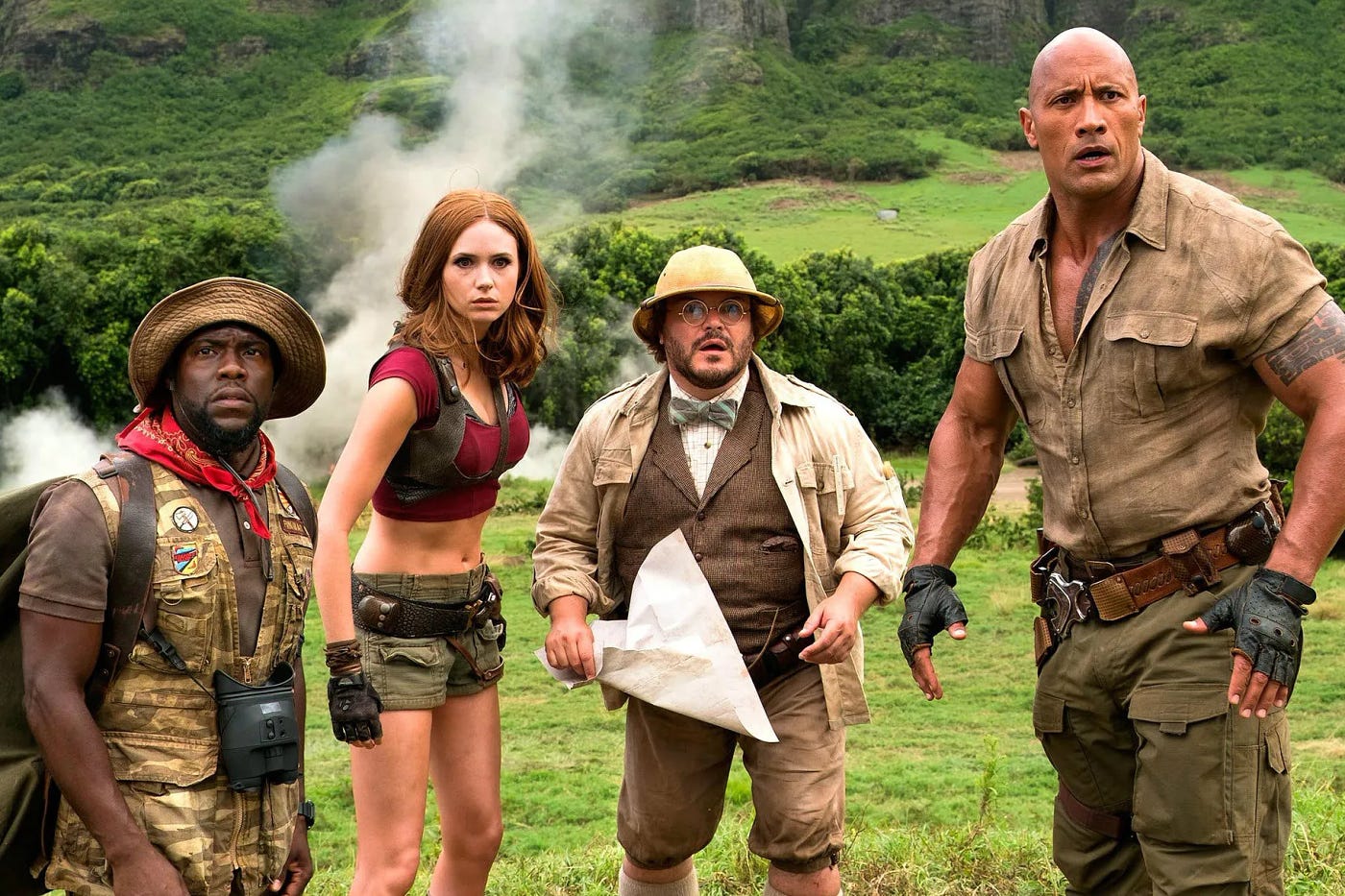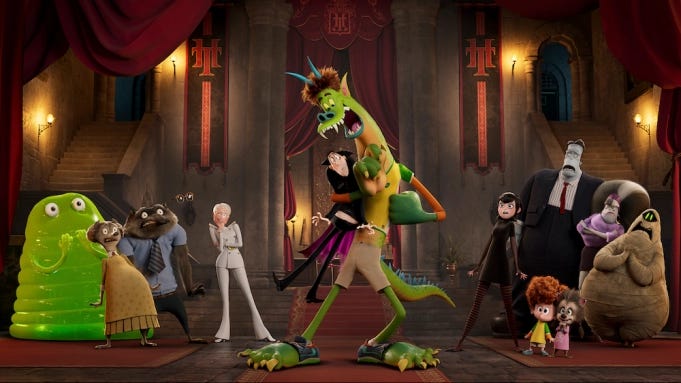If Sony Pictures were one of its own characters, it might be Peter Parker: discounted, dismissed, awkwardly misfit… until miraculously rising to the occasion. In Sony’s case, the occasion has been this decade’s unforeseen manifold events: the pandemic, streaming’s sputter and the beer goggles finally coming off as Wall Street falls in love with P&L again. In the cold light of day, Sony’s un-flashy leadership seems unusually well-suited for the moment. The buck stops with low-profile Sony Pictures Entertainment chairman/CEO Tony Vinciquerra, a “bread-and-butter guy” who has entrusted the Motion Picture Group to famously tight-fisted chairman/CEO Tom Rothman, a career survivor who, at 67, has outlasted nearly every one of his peers. The past year was the highest operating profits in company history, Sony’s third record year in a row despite Covid. One look at stock performance compared with other entertainment stocks reveals a far gentler bear market slide for un-sexy Sony (at least in the eyes of media and trade reporters) in the new nuts-and-bolts era (note: Sony also includes gaming, electronics and music): But this is still a business of hits (h/t to Richard Rushfield). Like our previous subject Paramount, for whom Top Gun and Yellowstone changed everything, so too has Spider-Man: No Way Home for Sony. It opened to $260 million domestically (second-highest domestic opening of all time) and also became the third-highest global opening, biggest December opening ever, third-highest domestic gross of all time (nearly $805 million) and the sixth-highest worldwide gross ever (more than $1.9 billion). It was 2021’s highest-grossing film worldwide, and it wasn’t particularly close. The studio, once ridiculed as the only major without a broad streaming service, now is free of that liability. It participates in the streaming economy as an arms dealer, a mercenary that licenses movies and TV shows to other outlets for guaranteed profit. (Amazon’s The Boys and Wheel of Time; Netflix’s Cobra Kai and AMC’s Better Call Saul.) And the key word is “license,” as Sony retains ownership over IP such as The Man From Toronto and the upcoming Matilda musical, both Netflix premieres in the U.S. But Sony never sells something off entirely, so the IP is still a part of the studio’s library. With Matilda, Sony will give the Matilda musical a traditional theatrical release in the U.K., a valuable theatrical territory, while Netflix releases the film in the rest of the world.  In addition to that co-production, Sony also has a first-look deal with Netflix for its direct-to-streaming titles, and Netflix also has Kevin Hart under an overall deal, which is why The Man From Toronto was particularly appealing to the streamer. After running the numbers, it made sense for Sony to fold that movie into its deal with Netflix. If the studio wanted to, it could explore options with that IP, including possible features, from not just those titles but other licensed entertainment (like The Boys). Sony was one of the earliest adopters of streaming platforms thanks to Crackle, though these days, its strategy is built on the idea that there’s still room in the crowded marketplace for niche streamers such as Crunchyroll (animation) and PureFlix (faith-based content). Theme parks are also not something Sony is known for, but the studio is prepping for the launch of Columbia Pictures Aquaverse, a waterpark slated to open Oct. 15 in Thailand. Additionally, Sony is working on three upcoming immersive shows that have yet to be announced, as well as four traveling exhibitions that will allow fans to dive deeper into the studio’s IP. Rothman keeps budgets to a minimum but spends big when he senses an opportunity, such as the unique deal he struck with Quentin Tarantino for Once Upon a Time in Hollywood, which reportedly allowed the director to quickly retrieve the copyright on that movie. Tarantino is the rare exception, of course — a unique filmmaker with unique needs. But when Rothman strongly believes in a filmmaker, he spares no expense and he’s willing to acquiesce to certain asks. However, at the end of the day, Rothman is a fiscally-minded business guy, so he’s not going to make a deal that puts Sony in the red, and he has ensured that the studio has turned a tidy profit by acting as a gun-for-hire. Rothman’s lieutenants include: Motion Picture Group presidents Sanford Panitch and Josh Greenstein, and then there are the label heads — Michael Barker and Tom Bernard (Co-Presidents of Sony Pictures Classics), Kristine Belson (President of Sony Pictures Animation), Steven Bersch (President of Screen Gems), Nicole Brown (President of TriStar), and Elizabeth Gabler (President of 3000 Pictures). This group of executives has done fairly well given what they’ve had to work with, considering Sony doesn’t have the same level of IP as, say, Disney or Warner Bros. But it certainly helps to have what is arguably the most beloved character in cinema history. Which brings us to… THE FRANCHISES 🍿Spider Man (and Venom, Morbius, etc.)Okay, so Sony may not have the biggest bench in terms of franchises, but it wisely made a deal with Marvel Studios to get its marquee character Spider-Man into the MCU, which helped make the studio’s solo Spidey movies must-sees, even more so. And while plans are in motion for another Spidey trilogy starring Tom Holland, I don’t believe he has actually signed a deal yet, so those plans remain unofficial for now. That said, I’m sure that more Spidey adventures with Holland are a top priority for Rothman & Co., which is also counting on him as the anchor of its budding Uncharted franchise as well. Outside of live action, Sony Pictures Animation is prepping two Miles Morales-led sequels to Spider-Man: Into the Spider-Verse ($375 million worldwide, but it felt even bigger, right?) and there's also an animated series in the works at Disney+ titled Spider-Man: Freshman Year, which will follow Peter Parker in his first year of high school and celebrate the character's early comic book roots, but Sony isn’t involved in that series as its Spider-Man rights are limited to live-action and animated films. Meanwhile, it’s a good thing that Rotten Tomatoes scores mean so little to fanboys, because the performance of Sony’s non-Spider-Man comic book movies is encouraging, even if their quality has been lacking. I’m talking about the astonishing performance of:
The future is also bright, as J.C. Chandor’s Kraven the Hunter sounds encouraging with Aaron Taylor-Johnson surrounded by Oscar winners Russell Crowe and Ariana DeBose, while S.J. Clarkson’s unconventional Madame Web will star Dakota Johnson and Euphoria breakout Sydney Sweeney. Don’t expect a presence at Comic-Con though. It’s still early days on both fronts. Unlike Morbius, considered Spider-Man adjacent (a standalone with no real relationship to the Spider-Man movies, in the way the upcoming El Muerto starring Bad Bunny is likely to be positioned), Venom and the upcoming Kraven the Hunter and Madame Web movies have a direct connection to Spider-Man. Though the latter character is typically depicted as an older woman, the Dakota Johnson-led movie is expected to be an origin story. And yes, Marvel’s Kevin Feige does weigh in and offer notes on Sony’s Marvel movies that don’t feature Spider-Man. One insider credits Feige for guiding Sony’s approach and warning the studio not to get too ahead of itself in terms of building some larger universe in the vein of the Avengers movies. Sony Pictures’ universe of Marvel characters is still in its relative infancy, and the studio is still laying the groundwork to see where the story is organically heading and what the fans ultimately want from these movies. Sony has more than 900 Marvel characters to work with, and there are execs constantly sifting through those characters to see which ones could work on the big screen. Rothman, Panitch and Greenstein are leading those efforts, while Belson oversees the animated Spider-Verse. and Ravi Ahuja leads Sony Pictures Television’s efforts. GhostbustersOver the course of four movies, the Ghostbusters franchise has grossed nearly $1 billion worldwide. Though Jason Reitman’s Ghostbusters: Afterlife was met with mixed reviews (63 percent fresh on Rotten Tomatoes), the movie grossed more than $200 million worldwide, reinvigorating a beloved brand for the studio, which subsequently gave Reitman Jr. the keys to the franchise. Up next: an Afterlife sequel (due Dec. 20, 2023) from Reitman and writer Gil Kenan and an animated movie from Sony Pictures Animation, directors Jennifer Kluska and Chris Prynoski, and writer Brenda Hsueh, as well as an animated series on Netflix from Reitman and Kenan. Clearly, Sony ain’t afraid of no ghost. Afterlife’s McKenna Grace is a star in the making and I think a return to New York City and the original firehouse setting is a smart move for the sequel, which is expected to feature Ernie Hudson in a more prominent role. JumanjiThe second movie wasn’t quite as good as the first, but Sony clearly has a good thing going with Dwayne Johnson and Kevin Hart front and center. The two of them have proven to be a winning combo and if Sony can keep the costs down by maybe emphasizing the comedy more than the action, the studio should absolutely move forward with a third film after the second one grossed $800 million worldwide ($160 million less than its predecessor, but still nothing to sneeze at). There’s no update on Jumanji 3, but given the studio’s emphasis on Jumanji attractions around the world, it’s likely a priority for the studio, though both Johnson and Hart have busy schedules. Fun fact: Sony recently opened a Jumanji ride at the Gardaland Resort in Italy, and partnered with Merlin Entertainments to do six Jumanji attractions between the U.S. and Europe  UnchartedYes, Uncharted is a franchise now. Sony hasn’t officially confirmed a sequel, but the film did pretty respectable pandemic business, taking in $400 million worldwide, and Holland has discussed the likelihood of a sequel in past interviews. The studio has been unusually quiet, but seeing as how Uncharted is currently the third-highest-grossing video game adaptation domestically, and the fourth-highest-grossing worldwide, you can safely assume another Nathan Drake adventure is in the works. Ultimately, it’s Rothman’s call, but in his President’s Day memo to colleagues, he seemed excited about another installment. The EqualizerThis is a franchise that tends to sneak up on you because it doesn’t boast a nine-figure budget, but it delivers a solid (and consistent) return, as the first film starring Denzel Washington brought in $192 million worldwide while the sequel (Denzel’s first) grossed $190 million. The upcoming third film will reunite Denzel with his Man on Fire co-star Dakota Fanning, and it’s slated to hit theaters in September 2023. Hotel TransylvaniaTalk about a surprise hit. When the first Hotel Transylvania movie came out in 2012, did you think it would spawn a billion-dollar franchise? This franchise grew from $358 million worldwide to $475 million to $528 million before Sony sold the fourth one to Amazon for a cool $100 million (it was likely made for under $75 million). This franchise is ripe for some kind of streaming spinoff, so don’t be surprised if Sony Pictures Animation finds a way to keep it going somehow, even without the memorable voice of Adam Sandler. Additional franchisesThere are a few high-profile ones that don’t appear to be active at the moment, so let’s run down those real quickly…
THE SONY DIVISIONS ✏️ Columbia PicturesOutside of Sony’s big-ticket franchises, Columbia has some fun stuff brewing. First up is Brad Pitt’s action extravaganza Bullet Train, which the studio is hoping will launch a franchise. I haven’t seen it yet, but I do know that Pitt’s assassin, Ladybug, survives the events of the novel that inspired the film. Sony actually moved Bullet Train to August because of the crowded release calendar in June and July. It’s a big original property so they wanted to find it a spot where it had the most runway and studio brass is said to be cautiously optimistic about its late-summer prospects. Elsewhere, J.D. Dillard’s aerial war movie Devotion may remind some of Top Gun: Maverick (especially since it also stars Glen Powell), but there doesn’t seem to be any downside to that at the moment). Next April brings the Adam Driver movie 65, which has tried to keep its top-secret dinosaur-centric plot under wraps, to no avail. That one hails from A Quiet Place scribes Scott Beck and Bryan Woods. 3000 PicturesThis is Sony’s literary label run by Elizabeth Gabler, who generally has terrific taste. The adaptation of Where the Crawdads Sing comes this summer, and I’m very curious to see how that one performs given the studio’s emphasis on it at CinemaCon, and the fact that at one point last summer, it felt like every woman I knew was reading that particular book. The label also has wrapped an adaptation of Lady Chatterley’s Lover starring Emma Corrin for Netflix. PlayStation ProductionUncharted marked the first project from PlayStation Productions, which is really ramping up of late, as it has The Last of Us in production at HBO and a Twisted Metal series in production at Peacock, while adaptations of the popular games Ghosts of Tsushima and Gran Turismo are also in the works. Asad Qizilbash is president and Carter Swan is Senior Producer Screen GemsThe label just announced the cast of low-budget horror movie Horrorscope, which will follow a group of college friends (including Spider-Man’s Jacob Batalon and Alana Boden) who begin to die in ways connected to their horoscopes. Boden is also part of the cast of Screen Gems’ vampire movie The Invitation starring Nathalie Emmanuel. The company has also wrapped True Haunting, which stars Jamie Campbell Bower (Stranger Things) and Erin Moriarty (The Boys). I believe that Screen Gems is working on an Urban Legend reboot as well, and just this week, Oscar winner Russell Crowe signed on to star in Screen Gems’ horror movie The Pope’s Exorcist from Overlord director Julius Avery, so clearly, this label has been tasked with churning out genre movies for the studio. One movie that’s a little different and may have a higher ceiling given its two leads? The romantic tearjerker It’s All Coming Back to Me starring Priyanka Chopra Jonas and Outlander sensation Sam Heughan, who make a very pretty pairing together on paper. Sony Pictures AnimationWhile we continue to wait for Tom Holland to officially ink a deal for a new trilogy, Spidey fans can get their web-slinging fix via the Into the Spider-Verse sequels Across the Spider-Verse (2023) and Beyond the Spider-Verse (2024), so Sony’s fortunes are directly tied to this division. SPA is also behind the family films Harold and the Purple Crayon (starring Zachary Levi) and Lyle, Lyle, Crocodile (starring Javier Bardem and the voice of Shawn Mendes), plus Genndy Tartakovsky’s new movie Black Knight. The Smurfs franchise may have moved over to Paramount Animation but Sony Animation has its hands full with an animated Ghostbusters movie for Sony as well as an animated Ghostbusters series for Netflix. Sony Pictures ClassicsMichael Barker and Tom Bernard remain two of the classiest wheeler-dealers in indie film, and this year they’re expected to have The Son, which marks Florian Zeller’s follow-up to The Father and reunites him with that film’s Oscar-winning star, Anthony Hopkins, who is joined by Hugh Jackman, Laura Dern, and Vanessa Kirby. SPC has also wrapped Benjamin Millepied’s modern-day reimagining of the classical opera Carmen, starring Melissa Barrera (In the Heights) in the title role. Stage 6 FilmsThis is Sony Pictures Worldwide Acquisitions’ label overseen by Joe Matukewicz, and its titles include Searching 2 and an adaptation of Chuck Klosterman’s novel Downtown Owl, so Stage 6 is still growing into its identity and coming into itself, though it typically handles low-budget projects. TriStar PicturesNicole Brown has been busy building TriStar into a label that the studio can be proud of again, with the Whitney Houston biopic I Wanna Dance With Somebody slated for awards season along with the historical epic The Woman King starring Viola Davis. Meanwhile, TriStar boasts some promising development projects, as Bill Condon is still attached to direct a remake of Guys & Dolls, while Scott Derrickson continues to work with the Jim Henson Company on a new untitled Labyrinth movie. WINDOWING 🗓Sony licensed several movies to streamers during Covid simply out of necessity, but it held onto broad event films to maintain exclusive theatrical runs. For example, Kevin Hart’s Fatherhood was licensed to Netflix, the LGBTQ-friendly holiday rom-com Happiest Season was licensed to Hulu, and the Tom Hanks movie Greyhound was licensed to Apple TV+. As for Sony’s windowing strategy, it has agreed to a 46-day theatrical window for most of its movies, as the studio believes it can maximize the revenue and cultural penetration for each of its titles within that time frame. However, the 88-day window for Spider-Man: No Way Home, rare these days in the industry, still led to the film’s record-breaking estimated sell-through launch. 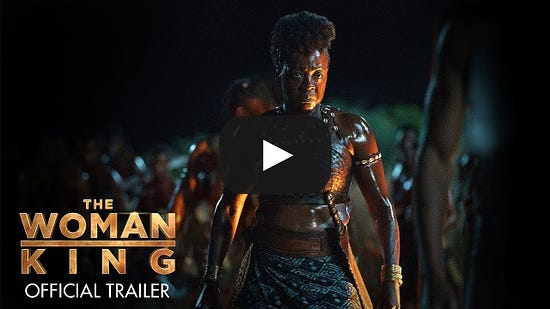 AWARDS 🏆The Whitney Houston biopic I Wanna Dance With Somebody is expected to make some noise this awards season thanks to a star-making performance from Naomi Ackie, while Viola Davis’ historical epic The Woman King and Tom Hanks’ comedy A Man Called Otto are also expected to be contenders. And keep an eye on Devotion starring Jonathan Majors and Top Gun: Maverick aviator Glen Powell. That one could surprise this fall, or at the very least, compete for some below-the-line honors along with Bullet Train, which will no doubt feature top-tier sound and visual effects. One project we won’t see this year? The George Foreman biopic Heart of a Lion starring Khris Davis, which looked really good based on the footage I saw at CinemaCon, but it won’t debut until April 2023. I suspect it could be a stealth awards contender next year. Sony may lack a strong Best Picture contender this year but Ackie, Davis and Majors could all surprise, and you can never count out Tom Hanks, who is back on top of the box office this week with Elvis. All in all, Sony is well-positioned going forward, as it has a healthy TV business and a streaming service might only be a burdensome albatross around its neck. By operating as a free agent, so to speak, it has greater flexibility within the marketplace and can more quickly adapt to the industry’s never-ending changes. Rothman is the kind of old Hollywood tiger who may never change his stripes, but it’s hard to argue with the results he has posted of late, and he represents a figure of stability in an increasingly chaotic studio landscape. Long may he reign! New on The Ankler.
|


